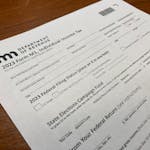WASHINGTON – Railroads are warning Congress that if they don't get more time to install new safety equipment on their rail lines by the end of October, there will be a nationwide freight and passenger meltdown at the end of the year that could affect everything from grain operations to farmers seeking fertilizer to Minnesota passengers trying to get to Chicago.
Dow Chemical, the American Chemistry Council and others are sounding alarms that they will be unable to ship products to vast sections of the United States — including Minnesota — if freight trains stop hauling their materials.
Many politicians are openly annoyed that the railroads have failed to meet a federal deadline first imposed eight years ago.
Among them is Gov. Mark Dayton, who said in a recent e-mail, "I think the railroads should be required to meet the deadline, and stop threatening us for having to do so."
Railroads are seeking a three-year extension that they say would give them the time needed to install new safety mechanisms called Positive Train Control. The GPS-based system is designed to control train movements and boost safety by preventing collisions and derailments caused by speeding.
Technically, Positive Train Control is required only on rail lines that haul hazardous materials and passengers. But Burlington Northern Santa Fe railroad warned the Senate Transportation Committee in September that it was unclear on the federal requirements and because it was not ready to meet the Dec. 31 deadline, it might have to slow down or even halt all its freight and passenger contracts. Such a move would disrupt virtually every industry in Minnesota — logging, agriculture, manufacturing and tourism. Minnesota moves roughly $192 billion of materials a year on trains.
"It's hard to be in this spot, not knowing whether or not we can use the railroads," said Amber Hanson, a director of public policy at the Minnesota Farm Bureau, which along with a number of agricultural groups is urging Congress to pass an extension within the next few weeks. "I think it's going to be a big issue if we can't get an extension. Agriculture depends on our railroads for running efficiently and to carry our products."
Minnesota's two Democratic senators, Amy Klobuchar and Al Franken, have already voted once for an extension, but the House has not taken up any measures. Franken said he wished railroads would implement Positive Train Control "as quickly as possible."
"If the deadline is extended, I want to make sure that we keep pressuring railway companies to make railroads safer," he said. "I'm going to keep fighting to improve our country's rail safety standards."
Klobuchar said in a statement that "recent train derailments across the country have made clear the need to boost rail safety."
'Safety is not No. 1'
Bruce Glover, a Minnesota-based vice president of the Brotherhood of Maintenance of Way Employees Division, called the threats from the railroads a "fine example of corporate arrogance."
"They are asking for three more years. You can go to Pluto in six years, and they had eight years to get ready," he said. "I don't think it was a priority … It's disappointing it isn't done. It sort of says out loud that safety is not No. 1 like they say it is."
Railroads say they are committed to installing Positive Train Control, but that eight years isn't enough time to get it on the vast numbers of rail lines across the country.
Passenger trains, including many commuter lines and Amtrak, have also said they would not meet the Dec. 31 installation deadline. Rail lines in Chicago, New York, Virginia, Los Angeles and Boston all have said they likely would cease operating without an extension from Congress.
Railroad officials say if an extension is not granted — and soon, because of the sprawling networks of business contracts — they would have no choice but to stop operating huge portions of their networks.
"It's not off-the-shelf technology. It's had to be developed from scratch," said Ed Greenberg, a spokesman at the Association of American Railroads. "We have indicated to Congress that we're making progress … but we need some extra time so that it's done right and done safely."
Larry Mann, a D.C.-based railroad safety attorney, called the threats that railroads would stop hauling "empty" because of a federal "common carrier" requirement that railroads honor reasonable requests from shippers.
"They can't refuse to haul," said Mann, who said he is urging Congress keep the deadline so railroads work harder to get done within the next year. "If they had their choice, they wouldn't be transporting any hazardous materials, but they don't have that choice."
Allison Sherry • 202-383-6120



